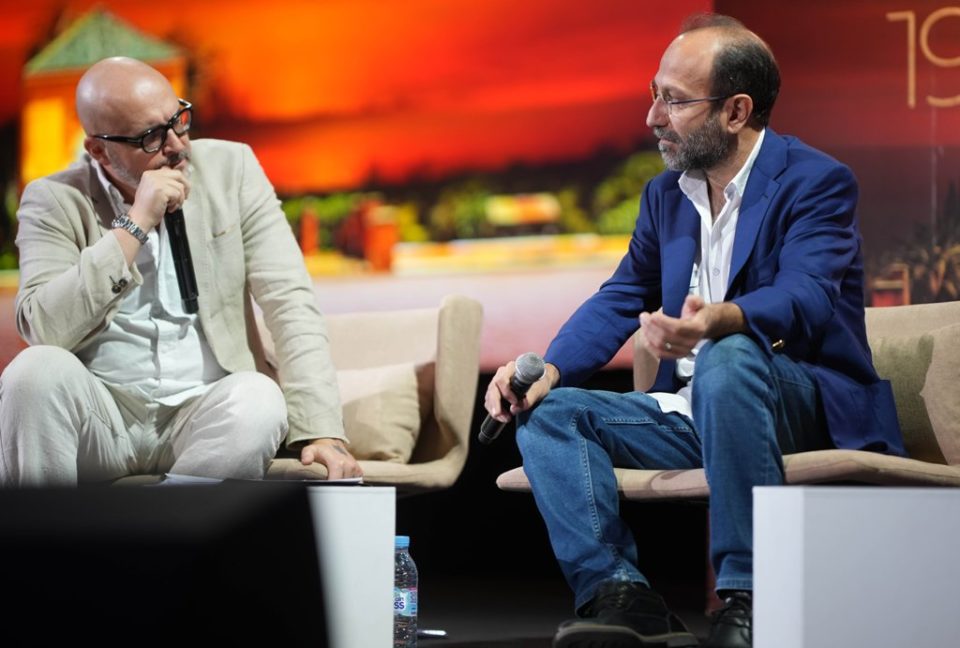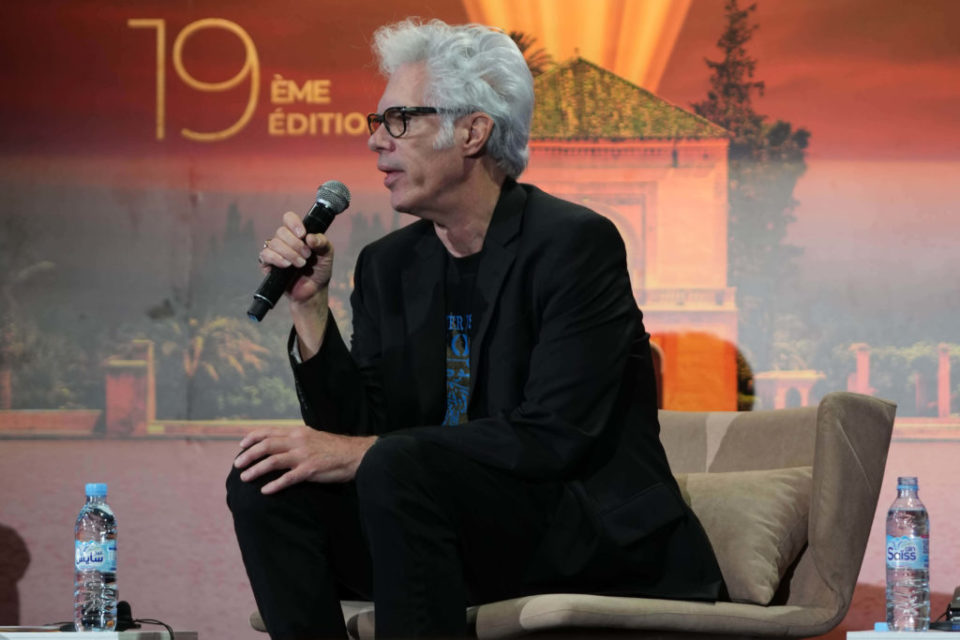Why it Pays to be at Marrakech International Film Festival
There’s a reason why stars including Martin Scorsese, Tilda Swinton, Shah Rukh Khan and Anurag Kashyap have frequented the festival even though they weren’t paid for attending it. Read on to find out why
The Marrakech International Film Festival came to a close on Saturday evening with Iranian director Emad Aleebrahim Dehkordi’s A Tale of Shemroon taking the festival’s grand prize, Etoile d’or (Golden Star).
Set in Tehran, A Tale of Shemroon tells the story of two brothers and how they cope with love, loss and rage.
In between tender moments of brotherhood, the film creates moments of high tension as the elder brother, furious with his father for frittering away family savings, gets sucked into dealing drugs, and the younger one, who is training to be a professional fighter, pays the price for it.
The festival uniquely considers only directors’ first and second feature films for awards. And of the 14 films in the competition section this year, six were by women directors.
The festival’s seven-member jury, led by Italian director Paolo Sorrentino, awarded the best direction prize to Switzerland’s Carmen Jaquier for Thunder, a story set in 1900 about a 17-year-old girl’s desires and religious repression.
And the jury prize for best director went to Portugal’s Cristèle Alves Meira for her feature film Alma Viva and to Maryam Touzani for The Blue Caftan, which is also Morocco’s entry for the Oscars this year.
The award for best performance by an actress went to Choi Seung-Yoon for her role as a young Korean single mother in Canada in director Anthony Shim’s Riceboy Sleeps. And Indonesian actor Arswendy Bening Swara took the best performer, male, award for his role as Purna, a retired general who is running for mayoral elections in director Makbul Mubarak’s film, Autobiography.
The nine-day Marrakech International Film Festival, which opened on November 11 by honoring Ranveer Singh with a trophy and screenings of three of his films, closed with a touching tribute to Tilda Swinton.
Ruben Ostlund, the director of Triangle of Sadness, did the honors by calling Swinton “the David Bowie of cinema” for her ability to change form with every role. The festival pulled off a pleasant surprise by flying in Swinton’s daughter, Honor Swinton Byrne, to present the Golden Star trophy to her. Mama Swinton was teary-eyed and seemed genuinely moved by the gesture.
‘It’s hard, it’s not easy’
The Marrakech Film Festival, now in its 19th year, had an impressive line-up of 76 films from 33 countries and opened with Academy award-winning director Guillermo Del Toro’s new animation film, Pinocchio. But apart from that, the festival didn’t have any big film premieres.
Yet, every year the festival attracts top actors, directors and stars from across the world, including Hollywood, Bollywood, Africa, the Arab world, and Europe.
On Saturday, the hour-long closing ceremony at the festival’s main venue, Palais des Congres, was like a curtain call of cinema’s A-listers.
British actors Jeremy Irons and Tilda Swinton, two-time Palme d’Or winner Ruben Ostlund, Paolo Sorrentino whose 2013 film, The Great Beauty, won an Academy Award, Vanessa Kirby (who plays Princess Margaret in the Netflix series The Crown), German actress Diane Kruger who starred in Troy and Inglorious Basterds, Australian director Justin Kurzel whose 2011 film Snowtown, a gruesome real-life crime drama, remains his most recognized work, the stunning Lebanese director and actress Nadine Labaki, French-Algerian actor Tahar Rahim who recently played Charles Sobhraj in The Serpent, and director Laïla Marrakchi whose 2005 film, Marock, about an affair between a Muslim girl and a Jewish boy, remains one of Morocco’s most loved and most controversial films, were on the stage at the same time.
Throughout its nine days, the festival organized two conversations a day, including with Iranian director Ashgar Farhadi, American director Jim Jarmusch, young French director Julia Ducournau who won the Palme d’Or for Titane, actress Julia Delphy, and Ranveer Singh, who also entertained a massive crowd at Marrakech’s iconic Jemaa el Fna square.
“It’s hard, it’s not easy,” says Melita Toscan du Plantier, director of the Marrakech International Film Festival, about getting all these cinema celebrities to Marrakech, at the same time.
“There are many festivals in the world and we arrive at the end of the year, after all the film festivals are over. So we have to fight to get people, to get films… They all come to Marrakech because, I guess, I find the right way to ask them [laughs]. But also because Marrakech is a city that’s always on the mind of people from overseas, as a very exotic city,” she told Rolling Stone India.
‘We never paid Shah Rukh Khan, Amitabh Bachchan, Aamir Khan, Deepika Padukone. We only pay for tickets and room’
Melita runs the festival like an Indian mother would organize her daughter’s wedding.
She organizes all the meetings, checks the logistics, picks jury members, who the festival will pay tribute to, and even the films for screening. “From the dinners to logistics, from cars, hotels, who stays where, I look at everything. I like it when everything is really perfect. I think people see that and they really liked that, too… Not like it is in India, I’m sorry. I have been to Mumbai so many times and I remember once I was invited by Shah Rukh Khan to the Filmfare awards. It was so funny because there were strings everywhere, rows were empty, stars were walking in during the speeches,” she said.
Morocco, a nation of 37 million people, has about 45 cinema screens. And though it’s amongst the top three African countries (along with South Africa and Egypt) in terms of the number of films produced, the annual average is about 20-25 films.
Yet, the Marrakech Film Festival, whose patron is Prince Moulay Rachid, is run efficiently and with a view to encourage invited guests to meet each other, attend screenings and have conversations with cinephiles and journalists about films.
Delays are few and brief. The staff is extremely courteous, and there are regular shuttles to various venues, including the stunning Yves Saint Laurent Museum where contemporary and restored classics from the Arab world and the African continent are screened under the category called ‘11th Continent.’
“The difference between us and some other festivals from the Arab countries, especially Saudi Arabia and Qatar, is that we never pay anyone. All the Indian stars who’ve been to the Marrakech Film Festival have never been paid, ever. We never paid Shah Rukh Khan, Amitabh Bachchan, Aamir Khan, Deepika Padukone. We only pay for tickets and room,” Melita said.
The festival punches above its weight because of the goodwill ambassadors it has nurtured over the years, including Martin Scorsese, who is the festival’s “godfather.” “He’s been to the festival seven times and he wanted to come this year too, but he couldn’t because he was celebrating his 80th birthday. So when you have ambassadors like Francis Ford Coppola, Martin Scorsese, James Grey, and now Tilda Swindon… [it helps],” says Melita.

‘Marrakech traps you… You keep wanting to come back’
Marrakech is called the Red City because of the colour of its buildings, a tad darker than Jaipur’s pink color. And there’s something about the city’s sky that is like an ever-changing canvas of colors with tall palm trees swaying gently in a cool breeze, al-fresco dining, “petite” yellow taxis and two white camels standing like sentinels at the entrance to the old city, Medina. It also has some of the best hotels and spas in the world and the festival puts its shiniest, classiest foot forward as it rolls out the red carpet for its guests.
All the actors and directors invited by the festival stay at the Rs 43,000-a-night La Mamounia hotel. The 99-year-old, 32-acre property is an island of laid-back luxury and indulgence with bits of history strewn all around. British Prime Minister Winston Churchill would stay at the hotel every winter to “recharge his batteries” and paint. Alfred Hitchcock shot several scenes of The Man Who Knew Too Much here and Paul McCartney composed the song, “Mamunia,” here in 1973.
Apart from the hospitality, what also attracts actors and directors is the relaxed atmosphere where they can , maybe, spend a few hours at a hamam and catch up with each other over drinks.
“We don’t have any commercial pressure. For example, in Cannes or Venice Film Festival, it’s commercially important for films to have the best international reviews because if at Cannes a screening goes wrong, your film is dead. So, all these huge festivals are very stressful. In Marrakech, we don’t have that. The stars, when they come here, often don’t have bodyguards apart from Indian stars because they are like God here. I’ve seen so many American stars walking around without bodyguards, including Keanu Reeves, Robert De Niro. I mean, it’s really relaxed, it’s really Zen, and they have lots of time to meet, to chat, which in Cannes they don’t have because they are all in different hotels, and everybody’s rushing, everybody’s stressed,” Melita says, and then adds, “I am also known for putting people together.”
What she means is her knack for knowing who wants to meet whom.
In 2013, she called Anurag Kashyap and asked him if he would like to spend 12 days with Martin Scorsese, Marion Cotillard and Paolo Sorrentino as part of the jury. “He almost cried,” she said.
Since then, Kashyap calls her “my goddess” and Martin Scorsese is “Marty.” He was back in Marrakech this year, with his new film, Almost Love, which is releasing in theaters in India next year. The film had a screening at the Jemaa el Fna square.
“Marrakech traps you. You can’t leave. You keep wanting to come back,” Moroccan journalist Said el Mazouari said.
Marrakech’s magic is a lure. But so are the delightful surprises Melita and her team pull out.








